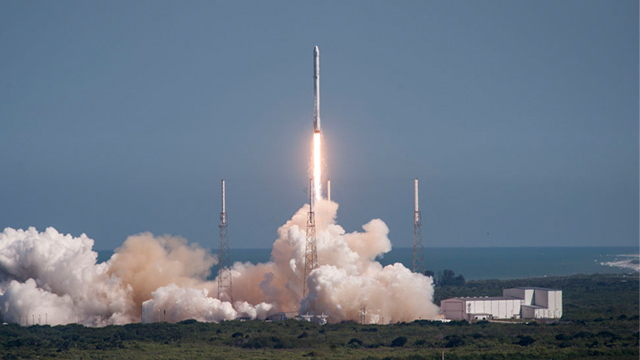In yet another episode of ‘What crazy idea is Elon Musk trying to disrupt the world with this week?,’ the billionaire’s space company has officially requested FCC permission to begin testing satellites for what could become a globe-spanning internet.
Rumours of said spacenet began to crystallize this past January, when Businessweek published a report outlining SpaceX’s plan to cover every human being in a glorious blanket of high-speed wifi. Basically, Musk wants to use a SpaceX Falcon 9 rocket to shoot a constellation of small satellites into low Earth orbit that will beam signals to the far corners of the planet. The space internet would eventually pick up a decent chunk of web traffic in urban and suburban regions, in addition to bringing billions of Internet-less people into the digital age.
That, at least, is the plan. And with the new FCC filing — which would allow SpaceX to test the antennae on its satellites and determine if they’re currently strong enough to send signals down to Earth — it’s one that the Musk seems to have a vested interest in pushing forward. If the FCC permits it, SpaceX could begin launching test satellites as early as next year. And if all goes well, the service could be up and running in as few as five.
But. There’s one big issue here that SpaceX seems to be skirting, and that’s the price tag for the whole shebang. Deploying satellites closer to home makes good sense from a speed perspective — it cuts down on latency, the time delay issue that makes traditional satellite internet (which involves much larger satellites positioned much higher above the planet) vexingly slow compared with fibre optic connections. But there’s a tradeoff — the signal from low-orbiting satellites won’t be able to cover nearly as much of the planet. So, you’ll need a lot of satellites. Four thousand, according to Musk’s latest maths.
As Wired discusses this week, constructing and deploying four thousand satellites, even into low Earth orbit, could end up being very, very expensive. Indeed, a Bill Gates-backed effort to create a low Earth orbit space internet in the 90s folded when costs ballooned out of control. And when you’re talking about creating a service that’s accessible to folks in developing countries, it goes without saying that it’s going to have to be dirt cheap.
We’ll just have to wait and see if SpaceX can hack it. At this point, anyone that can offer me the tiniest sliver of hope for a Comcast-free future has my blessing. Godspeed, Elon.
[The Washington Post [Wired ]]
Follow Maddie on Twitter or contact her at maddie.stone@gizmodo.com
Top image via SpaceX
